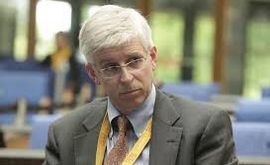Big Media’s looking at Israeli measures to fight Jewish extremism and to find the terrorists responsible for firebombing the Dawabsha family home. Ali Dawabsha, an 18-month-old burned to death; his parents and four-year-old brother are fighting for their lives.
In a separate incident one day earlier, six people marching in Jerusalem’s gay pride parade were stabbed. One victim, Shira Banks, died of her wounds yesterday. Dramatic photos caught an Israeli man, Yishai Shlissel, thrusting a knife at people before being subdued by police.
There are no suspects yet in the arson attack, but the timing of the two incidents has stirred Israeli introspection. Part of the Israeli conversation is about the use of the word “terror.” As David Graham explained in the pages of The Atlantic, there are legal and financial ramifications when an attack is labeled “terror.”

Unfortunately, the mainstream media has shied away from using words like terror or terrorists when talking about Palestinian suicide attacks, drive-by shootings, stabbings, fire bombings, etc. targeting Israelis. The approach to the t-word was summed up in an post-9/11 internal Reuters memo by Stephen Jukes, who was then the wire service’s global news editor.
We all know that one man’s terrorist is another man’s freedom fighter, and that Reuters upholds the principle that we do not use the word terrorist.
Thus, papers have used words like “militants” or “activists.” Or, in the rare instance when terror appeared in a headline , it would be within quote marks — as if editors wanted to make clear they hold their noses at the word or express some skepticism about the attack.
For years, HonestReporting campaigned for the mainstream media to call terror by its name.
Most Western papers following up on the Dawabsha aftermath have not used the word terror.
On one hand, it’s morally wrong to not call the attack on the Dawabsha’s home terror. But on the other hand, journalism’s kid-glove treatment of the word has been generally consistent. Take, for example, this Washington Post headline which put terror in quote marks:
Interestingly, it wasn’t just the t-word that was in quote marks, but “Jewish terror.” Perhaps the Post isn’t ready to assume that the perpetrators were Jewish?
That’s unlike The Guardian, which finally discovered that terror can exist without quote marks.
On one hand, I have to congratulate the paper’s editors for their courage.

This bravery is special because it appears to violate The Guardian’s guidelines on terror, which paraphrases Jukes:
Nonetheless we need to be very careful about using the term: it is still a subjective judgment – one person’s terrorist may be another person’s freedom fighter, and there are former “terrorists” holding elected office in many parts of the world.
I’d like to believe the paper is turning over a new leaf. But I’m not betting on it.
I can’t think of any any examples of Palestinian terror attacks that The Guardian ever labeled as terror. Ali Dawabsha certainly was a terror victim, but I’d like someone at the paper to explain why Israelis like Danny Gonen are not to cite just one example.
The Guardian won’t call Palestinian violence terror any more than it’ll call the people responsible for Ali Dawabsha’s death freedom fighters.
Featured image: CC BY southtyrolean/flickr and flickr/Ryan Brunsvold with modifications by HonestReporting


